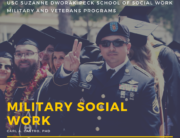A recent study by USC provides recommendations for veterans transitioning from active duty to civilian life.
Recently, the Center for Innovation & Research on Veterans & Military Families at the USC Suzanne Dworak-Peck School of Social Work published the results of an in-depth veteran needs assessment entitled, The State of the American Veteran: The San Francisco Veterans Study.
The study examined many crucial aspects of life for veterans following their active-duty period, including post-service education and financing, housing needs and general health and well-being.
Key findings include:
- 80% of service members leave the military without having a job lined up for civilian life.
- Many employed veterans in San Francisco are earning at or below the poverty level.
- Veterans in San Francisco report serious financial difficulties.
The results of the study illuminated the specific challenges that veterans face as they re-enter civilian life. So what can social workers and policymakers do to give veterans a fighting chance?
Recommendation #1: Help service members obtain at least one legitimate job offer by the time they leave the military.
The military currently runs programs known as the Transition Assistance Program / Transition Goals, Plan and Success (TAP / Transition GPS). While the programs are mandated for departing service members, there are currently no time constraints surrounding participation. The study recommends that these programs be mandated as early as 12 to 24 months prior to the end of military service, and that they be supported by local communities to ensure that service members can integrate into new jobs as soon as they arrive in their new hometowns. This is especially important in a city like San Francisco, where even a short-term income gap can prove to be financially devastating.
Recommendation #2: Provide enhanced job interview opportunities.
This recommendation would afford separating service members additional leave time to attend job interviews. Additionally, the study recommends that separating service members be provided with the resources necessary to conduct virtual interviews via video teleconferencing technology. Both recommendations would allow service members to go through the entire application, interview, and hiring processes prior to leaving the military (and, hence, without facing the burden of a significant pay gap upon departure).
Recommendation #3: Provide civilian employment training.
Civilian employment may require a vastly different skillset than that necessitated by military service. Those differences are often especially stark for service members who entered the military at a young age or for those who did not hold significant civilian jobs prior to enlistment. This recommendation would provide for training of military personnel to ease the transition into civilian employment, without denigrating either the civilian or military experience.
Recommendation #4: Offer a variety of job opportunities.
Many transitioning service members have spent their entire military careers in positions that do not translate easily to the civilian employment pool. Consequently, these veterans may find themselves unsatisfied with their work and frequently hopping from job to job. The study recommends that temporary employment agencies actively recruit transitioning service members and allow them to sample a variety of employment opportunities. In doing so, the hope is that veterans will be well-positioned for long-term job satisfaction and career success.
Recommendation #5: Innovate for hard-to-employ veterans.
Some service members may return to civilian life with enduring physical and/or psychological issues that make it challenging for them to find meaningful employment. The study implores civilian employers to develop innovative employment strategies for these hard-to-employ veterans, creating jobs that suit the specific needs of this group.









